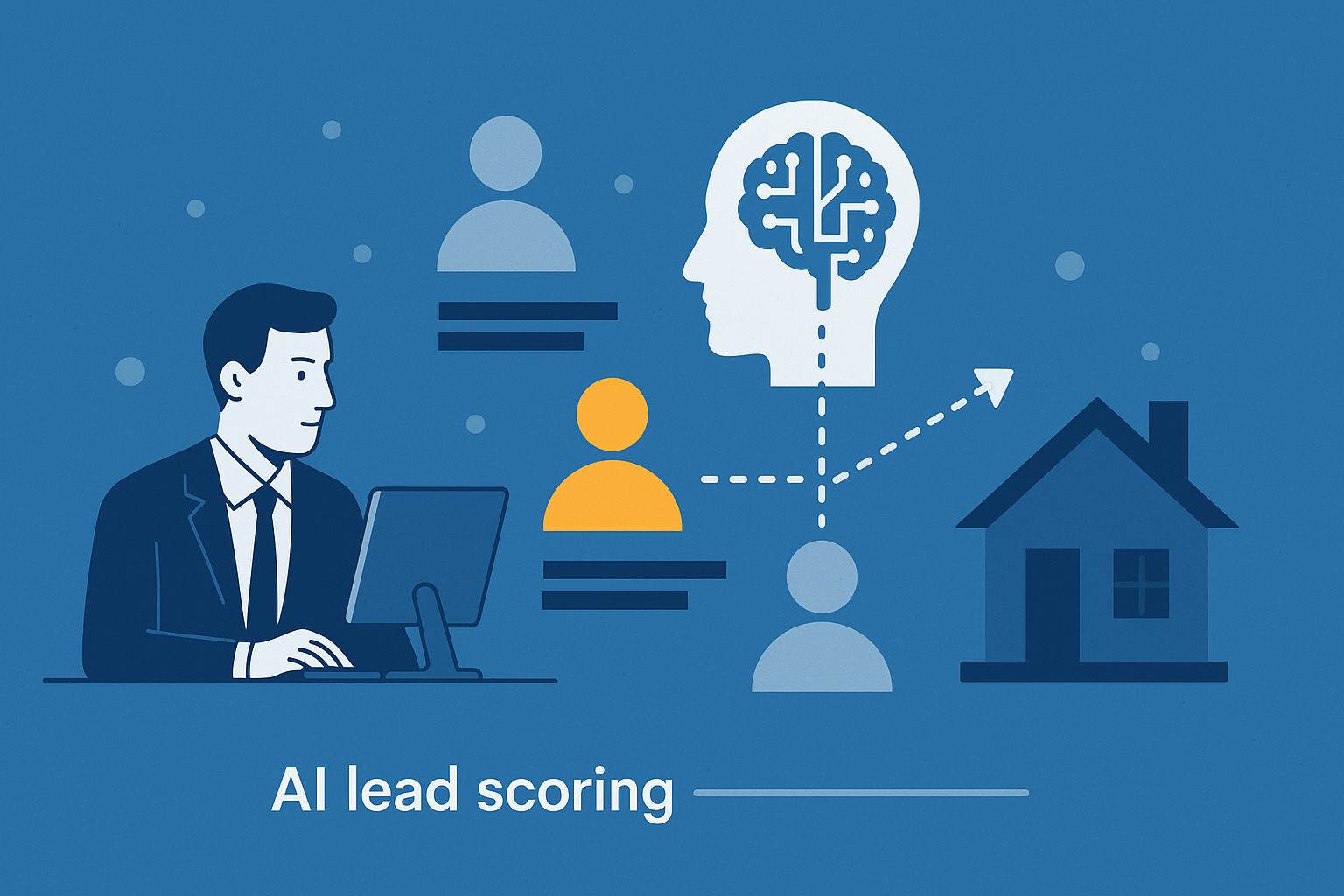What's in this article?
Your mortgage business receives hundreds of leads each month. Yet only a fraction convert to actual loans. The harsh reality? You’re likely spending thousands on leads that never had real potential in the first place. While your competitors struggle with this same challenge, smart lenders are turning to AI lead scoring to transform their conversion rates and slash acquisition costs.
The mortgage industry wastes an estimated 73% of marketing spend on leads that never convert. Meanwhile, early adopters of AI-powered lead scoring systems report conversion rate improvements of up to 300% by focusing their efforts on prospects most likely to close.
The Hidden Cost of Manual Lead Qualification
Traditional lead qualification relies on basic demographic data and generic scoring models. Loan officers spend countless hours chasing prospects who were never serious buyers, while high-intent leads grow cold waiting for attention.
Consider the typical mortgage lead journey. A prospect fills out an online form at 2 AM. By the time your team reaches out at 9 AM, that lead has already been contacted by five competitors. Without intelligent prioritization, your most motivated buyers slip through the cracks while resources get wasted on tire-kickers.
This outdated approach creates a cascade of inefficiencies:
- Average response times stretch to 24-48 hours
- High-value prospects receive the same treatment as low-quality leads
- Marketing budgets hemorrhage money on unqualified traffic
- Top-performing loan officers burn out from chasing dead ends
How AI Lead Scoring Revolutionizes Mortgage Lead Management
AI lead scoring systems analyze hundreds of data points in real-time to predict conversion probability with remarkable accuracy. Unlike traditional scoring methods that rely on basic demographics, AI models incorporate behavioral signals, financial indicators, and life event triggers to create comprehensive prospect profiles.
The technology works by examining patterns across your historical customer data to identify characteristics that correlate with successful loan closings. These systems continuously learn and refine their predictions, becoming more accurate over time.
Key data points analyzed include:
| Category | Data Sources |
| Financial Profile | Credit score, income, debt-to-income ratio, assets |
| Behavioral Signals | Website engagement, email responses, call patterns |
| Life Events | Home tenure, family changes, employment status |
| Market Timing | Interest rate sensitivity, seasonal patterns |
| Risk Factors | Previous applications, fraud indicators |
The ROI Impact: Real Numbers from Real Lenders
The financial impact of AI lead scoring extends far beyond conversion rates. Lenders implementing these systems report significant improvements across multiple metrics:
Conversion Rate Improvements: Leading mortgage companies using AI lead scoring see conversion rate increases ranging from 21% to 300%, depending on their previous processes and implementation quality.
Cost Reduction: By focusing marketing spend and staff time on high-probability leads, lenders reduce customer acquisition costs by an average of 35-50%.
Speed to Contact: Automated lead prioritization enables instant routing of hot prospects to available loan officers, reducing response times from hours to minutes.
Staff Productivity: Loan officers spend 60% more time with qualified prospects and 70% less time on dead-end leads, dramatically improving job satisfaction and performance.
Beyond Scoring: The Complete AI-Powered Lead Management System
Effective AI lead scoring integrates seamlessly with your existing CRM and marketing automation platforms. The most sophisticated systems provide real-time lead alerts, automated follow-up sequences, and predictive insights about optimal contact times and communication preferences.
Advanced AI platforms also incorporate compliance monitoring, ensuring all interactions meet regulatory requirements while maximizing conversion opportunities. This dual benefit reduces legal risk while improving operational efficiency.
The technology continues evolving rapidly. Next-generation systems incorporate external data sources like social media activity, property value trends, and economic indicators to provide even more accurate predictions about lead quality and conversion timing.
Implementation Best Practices for Maximum Results
Successful AI lead scoring implementation requires strategic planning and ongoing optimization. Start by auditing your current lead sources and conversion data to establish baseline metrics.
Data Quality Foundation: Clean, comprehensive historical data serves as the training foundation for your AI models. Invest time in data hygiene before implementation to ensure accurate predictions from day one.
Gradual Rollout Strategy: Begin with a pilot program targeting your highest-volume lead sources. Monitor performance closely and refine the system before expanding to additional channels.
Team Training: Ensure your loan officers understand how to interpret AI scores and recommendations. Provide clear guidelines for prioritizing leads and following automated recommendations.
Continuous Monitoring: Review system performance monthly and adjust scoring parameters based on results. Market conditions change, and your AI system should evolve accordingly.
Measuring Success: Key Performance Indicators
Track these essential metrics to validate your AI lead scoring ROI:
- Lead-to-application conversion rates by score tier
- Time from lead capture to first contact
- Average loan officer productivity per qualified lead
- Cost per acquired customer by lead source
- Pipeline velocity improvements
Monitor these metrics weekly during initial implementation and monthly once the system stabilizes. Look for trends rather than daily fluctuations, as AI systems optimize performance over time.
Transform Your Lead Management Today
The mortgage industry stands at an inflection point. Lenders who embrace AI lead scoring gain significant competitive advantages, while those relying on outdated manual processes watch prospects and profits slip away to more efficient competitors.
ProPair.ai offers comprehensive AI lead scoring solutions designed specifically for mortgage professionals. Our platform integrates with your existing systems while providing the predictive accuracy and automation features needed to maximize your lead conversion and ROI.
Get Started with ProPair.ai Lead Scoring →
Frequently Asked Questions
How accurate is AI lead scoring for mortgage leads?
AI lead scoring systems typically achieve 75-85% accuracy in predicting lead conversion probability, significantly outperforming manual scoring methods that average 45-60% accuracy.
What data is required to implement AI lead scoring?
Minimum requirements include 6-12 months of historical lead data, conversion outcomes, and basic demographic information. More comprehensive data improves accuracy but is not required for initial implementation.
How quickly can I see results from AI lead scoring?
Most lenders observe improved conversion rates within 30-60 days of implementation, with full system optimization typically achieved within 90 days.
Does AI lead scoring work with all CRM systems?
Modern AI lead scoring platforms integrate with most popular CRM systems including Salesforce, HubSpot, and mortgage-specific platforms through APIs and native integrations.
What about compliance and fair lending requirements?
Leading AI lead scoring systems include built-in compliance monitoring and can be configured to ensure fair lending practices while maximizing conversion rates.


